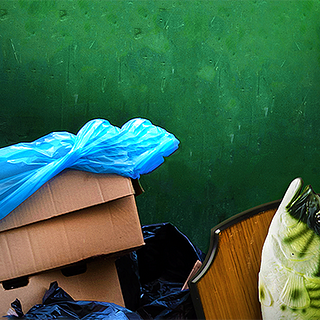Hartford
Garbologists Fails To Kill Its Darlings
by | Feb 7, 2024 12:12 pm
Post a Comment | E-mail the Author
Posted to: Theater

The Garbologists
TheaterWorks
Hartford
February 6th, 2024
WARNING: THIS REVIEW SPOILS THE BIG TWIST. YOU HAVE BEEN WARNED!
The Garbologists is a two-person play that tells the story of Danny (played by Jeff Brooks) and Marlowe (played by Bebe Nicole Simpson), two sanitation workers in New York City who have been paired together for the first time. They’re the classic odd couple: Danny is a tall, talkative, salt-of-the-earth white man, while Marlowe is an Ivy League-educated Black woman wrapped tighter than a mummy. Their two styles clash in the beginning of the play, until they start getting to know each other.
Playwright Linday Joelle has created an imaginative and authentic setting for her character study. I’m certainly no expert on garbage collection, but the street-smart explanations that Danny offers about how being a garbageman works (unsolicited, or course) sound genuine and interesting. The staging of the play is outstanding, as the stage seamlessly transitions from the cab of a garbage truck to a collection site to a bar where Danny and Marlowe share drinks and secrets.
Brooks and Simpson give great performances, which is necessary considering there isn’t much of a plot. The play is centered on a series of reveals about the characters and their pasts. So it’s up to the performers to sell it.
Brooks turns Danny into the kind of coworker you love to hate to love. He never shuts up, has an answer for everything and rubs it in Marlowe’s face every chance he gets, but he means well. Simpson is given more limited material; her only emotion for almost half of the play is haughty anger. When she’s allowed to emote later in the play, Danny describes her as “luminous,” and it’s the perfect word to describe Simpson when she’s given a full character to play.
After a series of contentious exchanges, the audience learns that Marlowe is so edgy and angry because she has suffered an unfathomable loss. Her 4‑year-old son Malik died from cancer. While Danny has been speaking metaphorically about losing his child to his ex-wife in court proceedings, Marlowe has had to deal with the pain of the literal version.
That reveal should draw the characters closer together. Instead there are a series of falling outs between the two over issues both small and large. These conflicts sometimes come out of nowhere, and rob the play of forward momentum as it begins to feel like the audience is waiting for the next fight.
Then there’s the ending of the play. In the penultimate scene, Marlowe reveals that Malik loved garbage trucks. In fact, when he was battling cancer towards the end of his life, two kind garbagemen made him a promise: if he got well enough, they would let him sit in the front of the garbage truck on one of their runs someday. It’s a heartwarming, if slightly contrived moment between Marlowe and Danny, until she makes the second big reveal of the play: The crew on the truck that day was none other than Danny himself and his partner, whom he eventually got fired.
This reveal breaks the suspension of disbelief that is critical to the success of any work of art. Contrivance and coincidence are the undergirding of all stories, because without them the improbable events that make stories interesting simply don’t happen. The job of a writer (and performers, directors, etc.) is to build a world so convincing and interesting that instead of rolling their eyes at the inevitable “that would never happen” moments of a story, the audience instead shrugs and says, “OK, sure.” Again: contrivance is not bad. It is necessary to tell any story.
At this point though, I moved beyond rolling my eyes to asking questions.
If Marlowe has known Danny this entire time, why was she so standoffish and rude to him in the beginning?
If she knows him to be a kind and genuine man, why does she refuse to give him the benefit of the doubt so often throughout the play?
If Danny has such vivid memories of Malik, why didn’t he remember his mother?
And if they already know each other, what is the play about? It’s a contrivance that essentially unravels the entire play.
There’s a cliche that every writer has heard over and over: Kill your darlings. That means that if there’s a metaphor, a sentence, a passage, even a character that you really like, you should look at that element with extra scrutiny. It’s not enough to like an element of a story. It has to work with the narrative. The garbage truck ride feels like a darling, because it hits a special emotional place, but it doesn’t work in the story at all. I can see why Joelle put it in the play, but someone who read it, who’s darling it wasn’t, should have told her to take it out.
Endings are hard to stick, so the ending of The Garbologists doesn’t undo what was an entertaining 90 minutes of good performances. Unfortunately, the ending does prevent something good from becoming something great.
NEXT
The Garbologists runs through Feb. 25 at TheaterWorks in Hartford.
Jamil heads out to a Japanese happy hour.